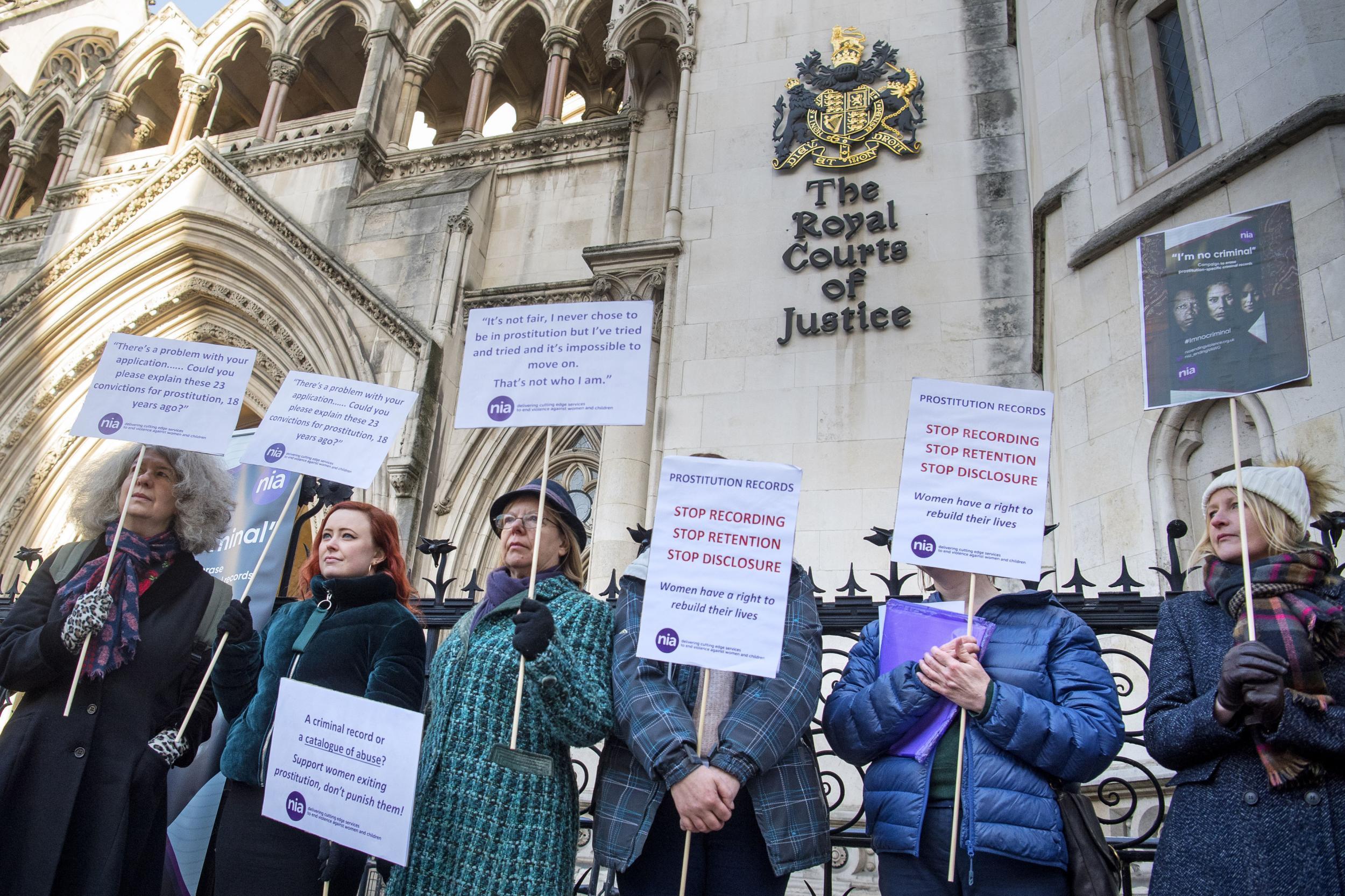Why won't the so-called 'sex workers' rights movement' help ex-teenage prostitutes have their convictions wiped?
I have never met anyone during my decades of campaigning against the sex trade who supports the criminalisation of prostituted people, and yet it has proved impossible to put aside our differences and form a united front


Your support helps us to tell the story
From reproductive rights to climate change to Big Tech, The Independent is on the ground when the story is developing. Whether it's investigating the financials of Elon Musk's pro-Trump PAC or producing our latest documentary, 'The A Word', which shines a light on the American women fighting for reproductive rights, we know how important it is to parse out the facts from the messaging.
At such a critical moment in US history, we need reporters on the ground. Your donation allows us to keep sending journalists to speak to both sides of the story.
The Independent is trusted by Americans across the entire political spectrum. And unlike many other quality news outlets, we choose not to lock Americans out of our reporting and analysis with paywalls. We believe quality journalism should be available to everyone, paid for by those who can afford it.
Your support makes all the difference.Today, as a case opens in the High Court in London to challenge the criminalisation of prostituted women, few sitting in the courtroom will be aware of the 20 year journey to get here.
The Government’s policy in relation to the retention, recording and disclosure of criminal convictions arising from street prostitution (soliciting) offences is inhumane and impractical, and the claim, brought by a group of formerly prostituted women, will argue for the first time that retaining the criminal records of women abused into prostitution as children is effectively a record of their own abuse.
It is also a gross violation of their private lives. All women were internally trafficked while under the age of 18, and none had chosen to sell sex.
The Judicial Review, which, if successful, would result in the criminal records of the applicants – all of whom were abused into prostitution as teenagers – being expunged, would be a crucial step towards recognising prostitution as a human rights violation perpetrated by the pimps and punters.
The campaign was born in 1997 out of a conversation between myself and Fiona Broadfoot, a sex trade survivor and one of the claimants in the case. When Fiona and I met, during the run-up to a conference on violence against women and girls in 1996, she had recently left prostitution, having been pimped onto the streets aged 15. Fiona told me that she had recently exited the sex trade and was trying to help other women do the same.
Fiona had set up a support group called the Street Exit programme, which consisted of supporting women wishing to escape prostitution. Fiona did this work in her own time, with neither funding nor expenses to pay her sizeable phone bill.
She told me that finding a job she wanted to do was a nightmare because she had a bad criminal record. Every single one of Fiona’s convictions were for street prostitution-related offences, and when she applied for jobs, particularly if the job would involve her coming into contact with children or vulnerable adults, she was required to disclose her previous convictions.
This also applied to volunteering posts, and would, in a grotesque twist of irony, exclude her from running Street Exit, had it not been a one-woman show without charitable status.
We decided to work together, alongside other campaigners and sex trade survivors, to achieve two distinct but connected aims – to fight to decriminalise the women, men and children selling sex, and to penalise and deter the men (because it is always men) who pay for sex, and therefore drive the demand for prostitution.
The polarised debate on the sex trade has been vicious and angry. The dominant view has long been that “prostitution has always been here and always will”, and “decriminalising the entire sex trade will make it safer for the women”. Those that espouse these views refer to prostitution as “sex work” and argue that criminalising sex buyers (referred to as “clients”) puts the women in danger.
I have never met anyone during my decades of campaigning against the sex trade who supports the criminalisation of prostituted people, and yet it has proved impossible to put aside our differences and form a united front.
When Fiona and I contacted members of the pro-prostitution lobby to ask if we could form a united front to argue for the decriminalisation of the women, we were told, in somewhat hostile terms, that they would not work with abolitionists. We were further told that if we dropped our efforts to criminalise sex buyers then they may consider joining forces with us. We refused.
In 1998, when Fiona and I (with others) set up a re-education scheme in an attempt to deter men from paying for sex in West Yorkshire, over 40 pro-prostitution lobbyists in the region met to discuss ways in which they could scupper the initiative. It would have been a better use of their time to be fighting to decriminalise the women, one would have thought.
The abolitionist campaigners continued to try and build bridges. In the mid-2000s, at the annual Police Vice Conference, I approached the then chair of the UK Network of Sex Work Projects (UKNSWP), which takes a firm view against abolitionism, and asked if we could work together to lobby police to support the decriminalisation of the women. She agreed, and we jointly presented our list of demands to the delegates. Our alliance was short-lived, however. I was told shortly after the conference that many members of the UKNSWP objected to working alongside those of us that refuse to see prostitution as a job like any other.
In my view, the key reason why abolitionists, and not the pro-prostitution lobby, are leading the way in the campaign to change the law in regards to the criminalisation of those selling sex is because we believe that the women (and men) involved in the sex trade are victimised. We consider prostitution per se to be harmful, and an abuse of human rights. The other side is so keen on sanitising this vile trade that they spend more time arguing in favour of decriminalising pimps and punters than they do exploring the abuse the women face at the hands of the buyers.
In order to build a coherent argument as to why prostituted people should never be viewed as criminals, it is necessary to be clear and honest about the violence and abuse inherent to prostitution. If we win this case, our next step will be to introduce a law in England and Wales that will criminalise the men paying or attempting to pay for sex. They are the criminals, not the women they use and abuse.
Update 12.40: Not one of the following sex workers’ rights movement organisations has turned up to the demonstration outside the High Court: ECP, IUSW, UKNSWP, UglyMugs. As this is an ongoing story, if they do make an appearance this piece will be updated
Update 15.05: The English Collective of Prostitutes (ECP) have released a statement in support of the High Court legal challenge
Julie Bindel is the author of The Pimping of Prostitution: Abolishing the Sex Work Myth (Palgrave McMillan, 2017)
Join our commenting forum
Join thought-provoking conversations, follow other Independent readers and see their replies
Comments